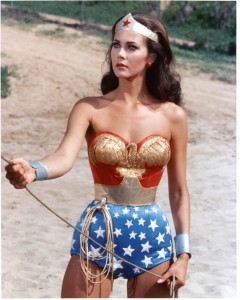Finding Feminist Media Studies
As Antenna begins a new series devoted to feminist media studies, I want to consider what it might mean to have such a series and why it might be necessary. You see, in my way of thinking about media studies and, more specifically, about television studies, feminism is not just an approach one might take. It’s kind of the point.
I recognize that this way of thinking about media studies may be limited, and that television studies in particular has changed somewhat in recent years. But I think it is worthwhile to consider how and why I might have this perspective and how and why the field has changed to make feminism a perspective to choose, to take on (or, presumably, off) at will.
To be trained in media and cultural studies, with a focus on television studies, in the 1980s and 1990s (as I was) was a feminist enterprise. The humanistic study of television at that time was heavily indebted to cultural studies, especially British cultural studies and its politicized view of media culture. This perspective understands all media and culture as sites of struggle over power. This power may at times take on conventional political-economic forms but it also includes the negotiation of social position and identity, matters we might more typically associate with feminism. I hope it is no stretch to say that this feminism is one not only concerned with gender as a locus of struggle but also sexuality, race, class, age, nation, ability, etc., all of which are inevitably intertwined with one another, and with gender. The question of gender is particularly significant in the study of television in the U.S., in that the medium’s primarily domestic location, its blatant commercialism, and its propensity for “lowest common denominator” programming are traits that have connected it historically to the feminine (as well as to the underclass). That a substantial body of television scholarship has focused on the feminization of the medium, and on soap opera as a feminized product of that feminized medium, also established the centrality of gender and a feminist approach to the study of TV. Television is a feminized medium, thus the very act of studying it, of taking it seriously as a space for meaning making and social struggle, is a feminist act.
Except that so much has changed in the media landscape, in the social positioning of television, and in dominant constructions of feminism and femininity, that this foundational belief has been challenged. With convergence, “television” is much less clearly bounded, media of all kinds have been digitized, and new institutions, technologies, and experiences have expanded what “media” may mean. As Michael Z. Newman and I argue in our book, Legitimating Television: Media Convergence and Cultural Status, these developments have been crucial partners to the cultural legitimation of the medium both within and outside the academy. Now, some television programs are seen as art, some television technologies are seen as high-tech and cutting edge, and some television viewers are seen as discerning tastemakers. This emerging cultural discourse puts the discussion of television, both academic and otherwise, onto different terrain, associating some dimensions of TV with the masculine and the upscale, even as the feminized and denigrated standing of the medium persists and the social hierarchies upon which these categorizations have been built continue to thrive.
The changes in and around television have been accompanied by social and political shifts that may also make it seem as if matters of cultural struggle, particularly over gender, are in the past. Central here is what many have labeled postfeminist culture, a new, hegemonic common sense that assumes that because various social movements have accomplished some of their goals (feminism, to be sure, but we can also consider post-race or post-gay rights perspectives similarly), that the work of such movements is done. A “post” perspective thereby assumes that inequalities no longer exist, and any mention of them—or of the movements that strive for justice in their name—take us backward, doing more harm than good. That postfeminist culture has become dominant alongside processes of legitimation and convergence has made it even more difficult for a feminist and politicized media studies to be the assumed norm. Postfeminist perspectives combined with the masculinizing discourse of legitimation may seem to evacuate feminist concerns from the study of TV—a troubling notion, to say the least.
What, then, might a feminist media studies series of blog posts offer us? For one, it might remind us of the terms that have motivated and animated television, media, and cultural studies. My hope is to see questions of gender and the other categories of identity with which gender intersects directing the questions we ask and the analyses we offer. This may mean talking about representations of women, or women working behind the scenes, or women users and audiences. But the kind of foundational feminist media studies I am championing understands feminism more broadly than this. It encompasses the gendered address of various media, the gendering of media in popular and industrial discourse, and constructions of masculinity alongside those of femininity, as well as a limitless number of other questions that take on the intersectional nature of social identity and power. Together, such inquiry insists upon the vital relevance of feminism for media studies, now, and always.






Excellent argument about reinvigorating media studies through feminism. I think the most important move here is this move towards a broader concern (“media”) rather than reinforce the medium specificity of television. While these media forms were always never as separate as they seemed to be, their boundaries now are entirely fluid and conceptual. Thus, while we can still have conceptions of “television” (or “film” or “literature” or whatever), we have to recognize their contingency and dynamism, as well as their histories.
What I’d like to see is exactly what you’ve called for, but without returning to a 1980s-90s conception of these media forms as intrinsically categorically distinct. Instead, we need to complicate these boundaries and differences, and challenge our own preconceptions (e.g., what is a television show anymore? Are these series “television”? Is this comparable to this? Can we assume we know what “people watching television” means anymore?). Conceptualizing these more complex categories, roles, and practices through considerations of cultural and social power, as you argue, is absolutely vital.
I think there are (at least) two ways that “feminist” can modify “media studies.” The first is affirmational, saying “the work under this umbrella is explicitly feminist in politics and focused on questions of gender.” The second meaning functions more through negation, distinguishing itself from alternative non-feminist, postfeminist or even anti-feminist types of scholarship that ignores or counters feminism. For me, the field of media studies is mostly feminist through this second definition, with specific works, journals, conferences, book series, blogs, etc. embracing the more self-defining first definition (which is how I read the launch of this series on Antenna). There is great value in promoting some work as explicitly feminist to insure its visibility and reaching a community of readers (not to mention the necessity of maintaining the term as a positive force in the minds of students), but I think a larger danger would be if publishers, editors & authors only put out explicitly feminist works under such a series – I assume Antenna is not saying “now we have a place to ghettoize all the gender stuff,” just as the sustained existence of the journal Feminist Media Studies doesn’t mean that other journals don’t publish feminist media studies.
Both meanings are are important, but we cannot assume that any work that doesn’t affirm its feminism under the first definition must be rejecting the second one, and thus rejecting feminism. Throughout its history, many landmark works of television & media studies would be hard to classify as affirmationally feminist, but still helped forge the field that I agree is largely feminist by the second definition (but less so by the first). There must be space for work that is not primarily about gender (or race, or industry, or reception, or anything) without labeling such work implicitly postfeminist – such work has always been part of the field, and is essential to build a larger vocabulary & understanding of media, even if the primary motivating questions are not explicitly feminist.
Thanks Elana for a provocative first post for this new series. I’m looking forward to future contributions. My comment is in response to your statement that “feminism is not just an approach. It’s kind of the point.” For me, I was a feminist first and a media studies scholar later. I have often thought that no matter what discipline I ended up in, my work would investigate power and identity. When I play a game, I play as a feminist. But, aca-fem-fandom aside…
What is exciting to me about media studies, and game studies in particular, has been the changing landscapes, disrupted industrial structures, and new audience/consumer/player practices that have come along since I was schooled in the 90s. In fact, all that is “new” in new media has only convinced me of the continued relevance of and necessity for feminist media studies. Intersections, fissures, convergences boundary-crossings, naming what is and isn’t (tv, a game, a film, etc) – these are all forces that feminism has interrogated well before it all went digital.
Great point, Nina. I like this idea of the study of a “new” medium demanding the same kind of feminist engagement as “older” media might. Very useful way of thinking!